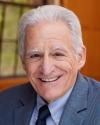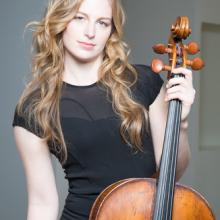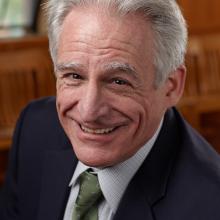Faculty colleagues Sarah Rommel and Craig Sheppard perform evergreen works by Beethoven and Rachmaninoff, George Crumb's Sonata for (Solo) Cello, and Nadia Boulanger's Three Pieces.
Program
Program Notes
Ludwig van BEETHOVEN (1770-1827): Variations on a Theme from Handel’s Judas Maccabeus, See the Conquering Hero Comes, WoO 45 (1796)
When Beethoven arrived in Vienna for good in 1792, he rapidly became known for his extraordinary abilities at the piano, not least of which was his ability to improvise. These variations, composed in 1796, are obviously in this mold and should be approached in the same manner by the performers. It was only after 1800 that Beethoven became increasingly known as the great composer that we cherish today.
Nadia BOULANGER (1887-1979) Three Pieces (1914)
Nadia Boulanger, known to hundreds of her students as Mademoiselle, was born to a Russian mother of royal lineage and a French father. She studied composition at the Paris Conservatoire with Gabriel Fauréand organ with Louis Vierne. Following the untimely death in 1918 of her younger sister Lili, whom she considered a far greater compositional talent, Mademoiselle built up a reputation as a great teacher of composition and theory, counting luminaries such as Aaron Copland, Walter Piston, Elliott Carter, Lennox Berkeley and Leonard Bernstein amongst her protégés. The three pieces on tonight’s program were composed at the outset of World War I.
George CRUMB (1929-2022) Sonata for Solo Cello (1955)
The listener soon realizes that this short sonata in three movements bears little resemblance to Crumb’s later compositions. It is tonal and employs none of the ‘advanced’ techniques of his more recent works. There is a distinct Hungarian influence in the first movement. The second movement theme sounds modal, as if from the Renaissance, and the Toccata movement is essentially built on a group of minor triads. The overall effect is mesmerizing!
Sergei RACHMANINOFF (1873-1943) Sonata in G minor, Opus 19, for Cello and Piano (1901)
Rachmaninoff’s Opus 19 Sonata for Cello and Piano followed quickly on the heels of his ever-popular Second Piano Concerto, Opus 18, composed in 1900 after a three-year bout of depression caused by the critical failure of his First Symphony. Like the concerto, the piano writing in the sonata is often dense and extremely demanding. Potential issues of balance between the instruments are mitigated by the glorious writing for the cello, line after line of intense poetry that creates a beautiful interwoven tapestry with the piano. Within the pages of Opus 19 are not only great technical challenges for both instruments but also some of the most beautiful melodies that Rachmaninoff ever composed, notably throughout the slow movement as well as the second themes in the other three movements.
We are playing this sonata in honor of Rachmaninoff’s 150th Anniversary celebrations this year.
—Copyright Craig Sheppard, 2023.
Biographies

Craig Sheppard is Professor of Piano at the School of Music of the University of Washington in Seattle. He is also Professor of the Advanced Innovation Center at the China Conservatory in Beijing, and his former students hold positions in conservatories and universities throughout the world.
A veteran of over fifty years on the international stage, in the past few seasons he has performed both Shostakovich’s 24 Preludes and Fugues and Bach’s The Art of Fugue in venues throughout the United States, as well as London, Manchester (UK), Jerusalem, Shanghai and Beijing’s Forbidden City Concert Hall, in addition to giving masterclasses at all of the above.
As recording artist, his LPs and CDs have appeared on the Sony, Chandos, Philips, EMI and AT-Berlin labels. He has published 26 CDs with Romeo Records (NY) since 2005, including the complete Beethoven sonatas (Beethoven: A Journey), the Six Bach Partitas, the Inventions and Sinfornias, both books of The Well Tempered Clavier, the last three Schubert sonatas, Liszt’s Années de Pèlerinage I and II, Debussy’s 24 Preludes and 12 Études (including both books of Images and Estampes), the 24 Preludes and Fugues of Shostakovich, Late Piano Works, Opus 116-19, of Johannes Brahms, and Bach’s Die Kunst der Fuge (The Art of Fugue).
Within the past two decades, he has traveled many times to the Far East for performances and masterclasses, including Japan, Korea, China, Hong Kong, and Singapore. He has performed at the Nehru Memorial Library in New Delhi, held a residency at the Melba Conservatory in Melbourne, Australia, and performed three times in New Zealand, including the first ever public performances of both books of Bach’s Well Tempered Clavier. Most recently, he performed the Complete Chopin Nocturnes at the Museu do Oriente in Lisbon.
Born in Philadelphia in November, 1947, Craig Sheppard graduated from both the Curtis Institute and the Juilliard School, studying with Eleanor Sokoloff and Sasha Gorodnitzki respectively. He also worked with Rudolf Serkin and Pablo Casals at the Marlboro Festival, and later with Ilona Kabos, Peter Feuchtwanger and Sir Clifford Curzon in London. During his early years, in addition to a successful début at New York’s Metropolitan Museum of Art, he won top prizes in the Busoni, Ciani, and Rubinstein competitions. However, it was his Silver Medal at the Leeds International Piano Competition in 1972 that brought him to international attention. Moving to London in 1973 and living there for the next twenty years, Sheppard taught at Lancaster University, the Yehudi Menuhin School, and the Guildhall School of Music and Drama. He also performed on multiple occasions with all the major British orchestras and with many on the European continent, under such conductors as Sir George Solti, Erich Leinsdorf, Kurt Sanderling, James Levine, Michael Tilson Thomas, Aaron Copland, Lord Yehudi Menuhin, Sir Charles Mackerras, Sir Andrew Davis, Sir John Pritchard, Esa-Pekka Salonen, David Zinman, and Leonard Slatkin. In the United States, he has performed with the orchestras of Philadelphia, Boston, Chicago, Atlanta, Dallas, San Francisco, Rochester and Seattle, and many others.
Craig Sheppard’s solo repertoire is eclectic, comprising nearly fifty solo recital programs and more than sixty concerti covering a wide spectrum within the Western canon. He also has a great love of chamber music and has collaborated with many great instrumentalists and singers, including Wynton Marsalis, José Carreras, Victoria de los Angeles, Irina Arkhipova, Ida Handel, Sylvia Rosenberg, Mayumi Fujikawa, the Cleveland, Emerson and Miró string quartets, and many musicians of the younger generation, including James Ehnes, Stefan Jackiw, Richard O’Neill, Edward Arron and Johannes Moser.
Sheppard is invited frequently to serve on the juries of distinguished international competitions, including most recently the Arthur Rubinstein International Piano Master Competition in Tel Aviv in May of 2021 and the National Society of Arts and Letters in Chicago in 2022. He also returns regularly to the Jerusalem Music Center to perform and teach, as well as the Chetham’s Summer School in Manchester, UK. With colleague Dr. Robin McCabe, Sheppard is Co-Founder and Artistic Director of the Seattle Piano Institute, a boot camp for aspiring young pianists held every July at the University of Washington, this summer celebrating its 14th anniversary.

